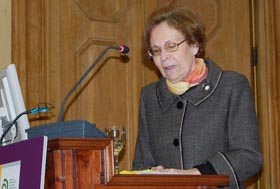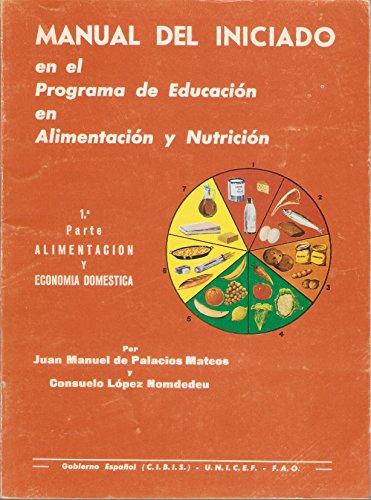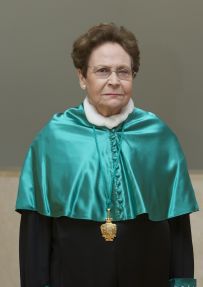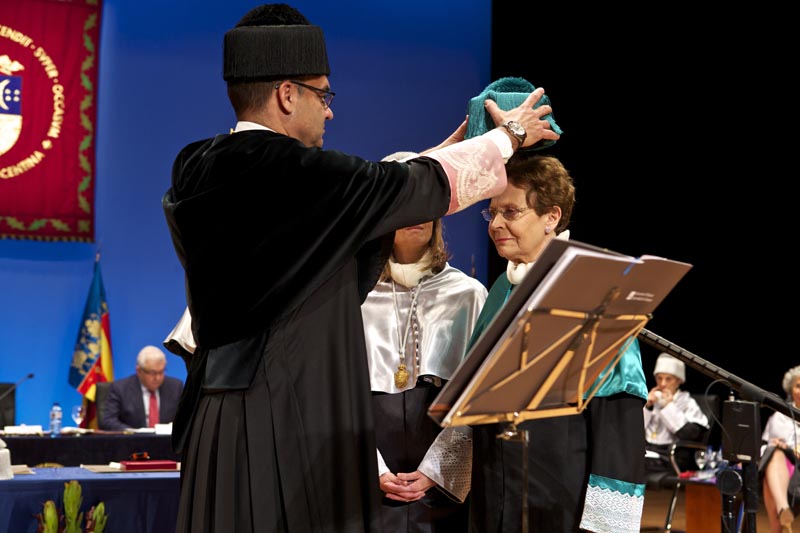
The extensive career of Consuelo López Nomdedéu as a public health nutritionist has allowed her, for more than 50 years of professional life, to display an excellent and fruitful work in the field of community nutrition and health education. Her great ability to work, her anxious spirit, her intellectual commitment and her involvement in the transfer of knowledge to society have allowed her to develop an integral conception of the process of promotion and education for health and have made her become a model in the field of food and nutrition education.
Consuelo López Nomdedéu started her professional activity in a complicated historical context, the Spain of 1960. She had previously completed her Teacher training studies with postgraduates in humanities, sociology and law, and was nationwide selected to carry out, under the auspices of FAO / WHO / UNICEF, the specialty of community nutrition and education in food and nutrition at the University of Rio Piedras of San Juan de Puerto Rico. It was this training and, as she says, “her interest in learning and teaching”, which placed her, when she returned to Spain, at the heart of the Food and Nutrition Education program, the EDALNU program, launched throughout the state with the technical and economic help of the international agencies that we have just mentioned.

This program was probably the most organised and interdisciplinary activity in the field of food education that was carried out in Spain in the second half of the twentieth century. At that time, the Spanish population was at the heart of the process of nutrition transition, overcoming the problems associated with malnutrition and gradually incorporating the guidelines of the current overfeeding, which is why intense healthcare is still needed. Trajectories such as Consuelo’s, who actively intervened as the backbone of the project, helped to institutionalise community nutrition in Spain, and took over from other professionals who had already begun the process during the Republican period. During the Republican stage, innovative health and nutrition policies were launched, which were truncated by the impact of the civil war and the hard years of the post-war period. More than 20 years had to go so that professionals like her took up these initiatives and raised a new conceptual and institutional panorama of educational interventions in food and nutrition.
The contribution of Consuelo López Nomdedéu as a member of the technical team of the program was fundamental for the integral and multidimensional vision she provided. She carried out research functions, both in the design and application of food consumption surveys and in the study of eating habits, which provided relevant results on the nutritional status of a large part of the Spanish population, and that were reflected in numerous publications. One of the characteristics of the research activity of professor López Nomdedéu was the consideration that these works allowed an approach to families and their food reality and an ethical conception of interventions in health, respectful and committed to the food culture of the population. As the author points out in the book Bioética y Nutrición (‘Bioethics and nutrition’), published in 2010, “educational interventions must be based on empowerment that allows citizens to control their own lives and their own health. Nutrition education programs have to respond to a basic need such as daily food and this response must be realistic in economic, social and cultural terms”.
Also, her teaching activity, both within the framework of the program and later in the university field, has been very intense. She was the director of EDALNU diploma courses, with more than 3,000 students trained, and later a professor at the National School of Health. Among other activities, she has collaborated in the teaching of public health master’s degrees in ten Spanish universities. As a result of this teaching and research work, she has published more than thirty monographs and teaching materials related to food and nutrition and more than one hundred collaborations in collective monographs and magazine articles that compile both the results of its research activity and its more pedagogical facet.
Among her concerns as a communicator and health messages disseminator, her conviction has always been on the role the media can play in the production of models and patterns of behaviour, in the modification of hierarchies of values and in the change of personal and collective aspirations, very often decision-making oriented regarding decisions that are in the productive system interest, forgetting the needs of the citizens. That is why she was highly involved as an expert in television, press and radio dissemination. From Radio Nacional, on Radio 5, Todo Noticias, with its indispensable nutrition advertisements, has helped to offset the risks of media sensationalisms and the false expectations that are so common in the field of food and health.

Her solid preparation and extensive experience have allowed her to act as an international interlocutor. She has carried out an important task for the representation of the Spanish health authorities in discussion groups, seminars and committees, and has undertaken advisory work in international organisms as relevant as WHO, FAO or the Council of Europe. This international dimension and her work as a manager in the design and implementation of health programs and policies, complete a vital and professional journey dedicated to the study and practice of education in setting and health and have determined her social commitment and of service to the citizens.
When assessing her trajectory as a whole, everything that she has contributed to the nutrition and health sciences has to be taken into account, and that she has been tracing a path that welcomes and guides the public health professionals. Despite the difficulties, as the example of Consuelo shows, cracks may have been opened in the so-called glass ceiling, and women have been able to normalise their academic, scientific and professional activity with their intellectual and vital stimulus as an indispensable reference.
On the balance of her merits a long list of distinctions and recognitions like the following are added:
- The Cross of Official of the Order of Civil Merit, in 1984.
- The professional career award of the Spanish Society of Community Nutrition, in 2001.
- The professional career award of the Society for Health Education, in 2002.
- EThe FESNAD (Spanish Federation of Nutrition, Food and Dietetic Societies) award, in 2005, for a lifetime dedicated to nutrition.
- The NAOS strategy award of special public recognition on her professional career and excellent work for having carried out activities to promote health and health education of the population in the field of food and nutrition, awarded by the Spanish Agency for Food Security and Nutrition in 2007.
- Doctor Honoris Causa by the University of Alacant, awarded on January 28, 2014.

In line with some of the activities carried out by Professor López Nomdedéu, researchers from the Balmis Research Group on Community Health and History of Science have focused their research on the analysis of the food policies that were launched in the Spain of the twentieth century and as a result of these, and in accordance with the philosophy of transfer of knowledge and scientific dissemination, launched the exhibition “How did we learn to eat. The educational and social action of the EDALNU Program, 1961-1966” that was exhibited at the López Piñero Institute of History of Science in Valencia from April 27 to October 27, 2017.
During November 2017 the exhibition was moved to Ciudad Real, in the Open University Cultural Classroom of the University of Castilla-La Mancha, and it is planned its tour during 2018 in Dénia and Alacant.
Associated with the exhibition, several didactic guides have been developed for undergraduate, primary and secondary education studies that can be downloaded from this link.
M. Eugenia Galiana-Sánchez, Josep Bernabeu-Mestre, Eva M. Trescastro-López
Balmis Research Group on Community Health and History of Science
Department of Community Nursing, Preventive Medicine and Public Health and History of Science of the University of Alacant.
Personatges i espais de ciència (‘Science characters and spaces’) is a project of the Unit of Scientific Culture and Innovation of the University of Valencia, with the collaboration of the “López Piñero” Institute of History of Medicine and Science and with the support of the Spanish Foundation for Science and Technology and the Ministry of Economy, Industry and Competitiveness.

















